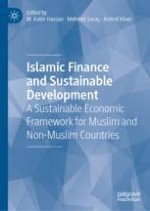2021 | OriginalPaper | Chapter
13. Qard Hasan (Interest-Free Loan) as a Tool for Sustainable Development—Global Evidence
Authors : Rashedul Hasan, M. Kabir Hassan, Mamun Rashid
Published in: Islamic Finance and Sustainable Development
Publisher: Springer International Publishing
Activate our intelligent search to find suitable subject content or patents.
Select sections of text to find matching patents with Artificial Intelligence. powered by
Select sections of text to find additional relevant content using AI-assisted search. powered by
